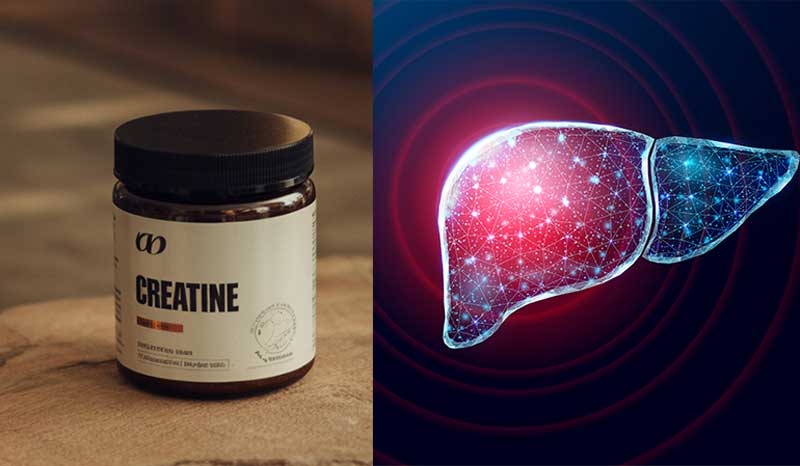Does Creatine Affect Liver? Myths vs. Facts
Creatine is one of the most popular supplements in the fitness and bodybuilding world, and its reputation as a muscle-building aid is almost universal.
In India, where fitness culture is rapidly growing, many gym-goers and athletes have started incorporating creatine into their routines.
But with increasing use comes a common concern: Does creatine affect the liver?
What is Creatine and How Does It Work?
To understand how creatine may affect your liver, it’s important to first know what creatine is and how it functions in your body.
Creatine is a naturally occurring compound found primarily in muscle cells.
It helps produce energy during high-intensity, short-duration exercises like weightlifting and sprinting.
Our body produces creatine in the liver, kidneys, and pancreas, and we also get it from dietary sources such as meat and fish.
Does Creatine Harm the Liver?
Creatine does not affect liver function in healthy individuals when taken at recommended doses. It's generally safe with no proven liver toxicity.
One of the best ways to address concerns is to look at scientific studies on creatine’s effects on liver function.
✅ Studies on Healthy Individuals
Research generally shows that creatine supplementation does not harm liver function in healthy individuals.
Multiple clinical trials have monitored liver enzyme markers that indicate liver health before and after creatine use.
These enzymes include ALT (alanine aminotransferase), AST (aspartate aminotransferase), and ALP (alkaline phosphatase).
In healthy participants, creatine supplementation did not cause any significant changes in liver enzymes or signs of liver stress, even when taken at recommended doses for extended periods (up to several months).
✅ Studies on Individuals with Liver Conditions
Data on creatine use in people with existing liver diseases is limited.
Because the liver is already compromised in such cases, it is always advisable to consult a healthcare professional before starting any supplementation.
The consensus is that while creatine is not inherently toxic to the liver, caution is warranted if you have liver-related health issues.
Common Myths and Misconceptions About Creatine and Liver Health
Several myths about creatine and liver damage have been circulating, often fueled by misinformation or a lack of scientific understanding.
✔️ Myth 1: Creatine Overloads the Liver and Causes Damage
Fact: Creatine is processed efficiently by the body, and its metabolism does not put excessive strain on the liver in healthy individuals.
✔️ Myth 2: Creatine Causes Liver Toxicity
Fact: No credible research has shown creatine to be toxic to the liver when used at recommended doses.
✔️ Myth 3: Creatine Increases Liver Enzymes Dangerously
Fact: Minor fluctuations in liver enzymes can occur due to various factors, but creatine supplementation within safe limits does not cause dangerous liver enzyme increases.
How to Use Creatine Safely for Liver Health?
While creatine is generally safe, it’s important to follow best practices to protect your liver and overall health.
🌟 Choose High-Quality Creatine
Opt for pure creatine monohydrate supplements from reputable brands available in India. Avoid products with unnecessary additives or fillers.
🌟 Follow the Recommended Dosage
The standard dosage is a loading phase of 20 grams daily for 5-7 days, followed by a maintenance dose of 3-5 grams daily. Overdosing can unnecessarily burden your body.
🌟 Stay Hydrated
Creatine increases water retention in muscles, so drinking adequate water helps kidney and liver function.
🌟 Avoid Combining with Other Liver-Stressing Substances
Be cautious if you consume alcohol or medications known to stress the liver. Combining these with creatine may increase risks.
🌟 Regular Health Check-Ups
If you plan to use creatine long-term, periodic liver function tests can help monitor your health status.
Who Should Avoid or Be Cautious with Creatine?
Although creatine is safe for most healthy adults, certain individuals should exercise caution:
-
People with Pre-existing Liver Conditions, Such as hepatitis or cirrhosis. Consult your doctor before using creatine.
-
Individuals with Kidney Issues: Since creatine metabolites are filtered through the kidneys, kidney health is also important.
-
Pregnant and Breastfeeding Women: There is insufficient evidence on creatine safety during pregnancy or lactation.
-
Young Adolescents: Creatine safety in teenagers is still being studied; professional guidance is advised.
Conclusion
Creatine remains one of the most researched and effective supplements for muscle strength and athletic performance worldwide, including India.
For the majority of healthy adults, creatine does not negatively affect liver function when used correctly.
The liver processes creatine naturally, and supplementation does not overload or harm it.
However, if you have existing liver or kidney issues or are uncertain about your health, it’s best to consult a healthcare professional before adding creatine to your regimen.
By understanding creatine’s effects on the liver and following safe supplementation guidelines, you can enjoy its benefits with confidence and keep your liver healthy.


